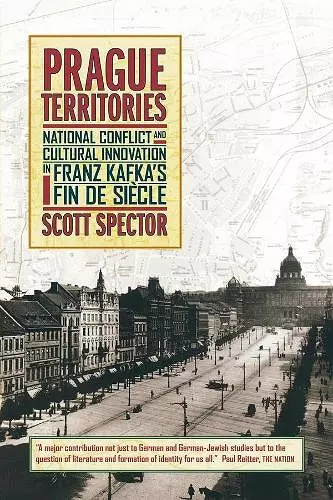Prague Territories
National Conflict and Cultural Innovation in Franz Kafka's Fin de Siècle
Format:Paperback
Publisher:University of California Press
Published:8th Aug '02
Currently unavailable, and unfortunately no date known when it will be back

DAAD Book Prize, German Studies Association
Explores the social, cultural, and ideological contexts in which Franz Kafka and his contemporaries flourished, revealing previously unseen relationships between politics and culture. This book identifies three fundamental areas of cultural inventiveness related to this Prague circle's political and cultural dilemma.Scott Spector's adventurous cultural history maps for the first time the 'territories' carved out by German-Jewish intellectuals living in Prague at the dawn of the twentieth century. Spector explores the social, cultural, and ideological contexts in which Franz Kafka and his contemporaries flourished, revealing previously unseen relationships between politics and culture. His incisive readings of a broad array of German writers feature the work of Kafka and the so-called 'Prague circle' and encompass journalism, political theory, Zionism, and translation as well as literary program and practice. With the collapse of German-liberal cultural and political power in the late-nineteenth-century Habsburg Empire, Prague's bourgeois Jews found themselves squeezed between a growing Czech national movement on the one hand and a racial rather than cultural conception of Germanness on the other. Displaced from the central social and cultural position they had come to occupy, the members of the 'postliberal' Kafka generation were dazzlingly productive and original, far out of proportion to their numbers. Seeking a relationship between ideological crisis and cultural innovation, Spector observes the emergence of new forms of territoriality. He identifies three fundamental areas of cultural inventiveness related to this Prague circle's political and cultural dilemma. One was Expressionism, a revolt against all limits and boundaries, the second was a spiritual form of Zionism incorporating a novel approach to Jewish identity that seems to have been at odds with the pragmatic establishment of a Jewish state, and the third was a sort of cultural no-man's-land in which translation and mediation took the place of 'territory'. Spector's investigation of these areas shows that the intensely particular, idiosyncratic experience of German-speaking Jews in Prague allows access to much broader and more general conditions of modernity. Combining theoretical sophistication with a refreshingly original and readable style, "Prague Territories" illuminates some early signs of a contemporary crisis from which we have not yet emerged.
"Contribute[s] many insights and food for thought in a question, the relation of culture to territory, with which we are, as recent events in Europe show only too well, still grappling."-Times Literary Supplement "A pioneering work of cultural history, whose self-reflexive and interdisciplinary approach will be of interest not only to specialists of Central European culture but also to a wider professional readership concerned with methodological and disciplinary issues."-Mary Gluck, Journal of Modern History "Working in between historical and formal literary analysis with great skill, [Spector] has produced a major contribution not just to German and German-Jewish studies but to the question of literature and formation of identity for us all."-The Nation "This admirably lucid, impressively well researched, and theoretically sophisticated book provides both a cultural history of Prague, focusing on its German-Jewish writers, and a broader context for reading Franz Kafka. It brings out the complex ways in which a 'minor' literature has a powerful if problematic political import."-Dominick LaCapra, Cornell University
ISBN: 9780520236929
Dimensions: 229mm x 152mm x 23mm
Weight: 590g
345 pages